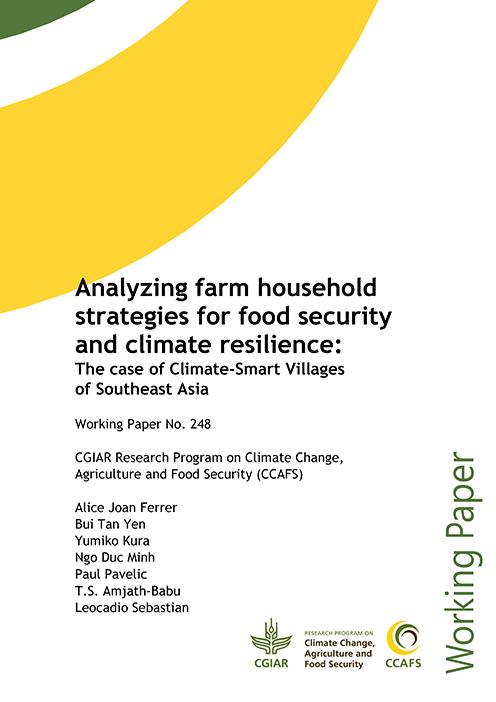How smart are climate-smart villages?

A newly developed conceptual framework assesses the climate-smart village approach in Southeast Asia, measuring livelihood strategies and outcomes targeted by the villages.
A study was conducted to present a framework that will evaluate the Climate-Smart Village (CSV) approach developed by the CGIAR Research Program on Climate Change, Agriculture and Food Security (CCAFS). The framework consists of indicators that measure the livelihood strategies and outcomes of three CSVs in Southeast Asia: Ekxang in Laos, Rohal Suong in Cambodia and Tra Hat in Vietnam.
The strategies assessed focus on:
- intensifying the use of resources,
- expanding the lands dedicated for crop cultivation,
- diversifying agricultural products,
- selling these products to the markets,
- using common lands, and
- migrating to urban areas.
The outcomes included highlight food security and asset ownership. In assessing these strategies and outcomes, the gender element was also analyzed by looking at the distribution of on- and off-farm tasks among men and women.
 Click here to read the publication. |
The indicators were quantified into a scoring system to measure the strategies of each CSV. The scores were validated by the percentage points that the CSVs received based on their livelihood outcomes. The overall scores suggest that more climate-smart interventions can boost climate resilience and ensure food security in the CSVs. Assessing interventions in this way can help to improve the CSV approach. Therefore, the interventions must be ranked based on the priorities of CSVs. Then CSV can implement them together with local organizations, governments, and funding agencies, to name a few.
Acquire assets; deal with hunger
The strategies are all dedicated to increasing the income of farmers under erratic climate conditions. Increased income means a higher financial capacity to acquire various assets. These include vehicles, production equipment, energy sources and information media.
Motorcycles and trucks, for instance, can ease the transport of farm products to the markets. Production equipment such as water pumps and motor-powered spraying tanks reduce farmer workloads and thereby increase the farm's productivity. Media platforms bring relevant information to farmers, preparing them for any upcoming extreme weather events.
All these assets can enhance the adaptive capacities of farmers against climate-related challenges such as prolonged droughts and flooding. The assets were translated into points that were used to quantify the outcome, “asset ownership,” in the CSVs.
Food security, the other outcome measured in the study, was computed based on the Food Security Index. This index determines the number of months within a year wherein CSV households experienced hunger. Hunger was defined in the study as the state of a lack of food on one’s farm. The study found out that climate-related challenges affect food supply and eventually lead to hunger in the CSVs.
Supporting livelihood strategies
Climate-smart agriculture (CSA) interventions can improve the livelihood strategies in the CSVs. Under a CSA approach, the strategies aim to increase agricultural productivity in the farms, enhance the resilience of farmers against climate change and reduce their greenhouse gas emissions. The CSA approach also promotes gender sensitivity and social inclusiveness in the household and farms. It fosters involving women and children in farming activities and key decision-making processes.
They can join in applying CSA interventions such as the use of stress-tolerant varieties, water-saving technologies, farm machinery and pest clinics. They can also engage in climate-smart aquaculture and agroforestry as well as mitigation activities such as alternate wetting and drying and mid-season drainage.
Download the publication: Ferrer AJG, Yen BT, Kura Y, Minh ND, Pavelic P, Amjath-Babu TS, Sebastian LS. 2018. Analyzing farm household strategies for food security and climate resilience: The case of Climate-Smart Villages of Southeast Asia. CCAFS Working Paper no. 248. Wageningen, the Netherlands: CGIAR Research Program on Climate Change, Agriculture and Food Security (CCAFS).
Read more:
- Blog: Why planting trees on farms benefits farmers under a changing climate
- Publication: Village Baseline Study: Site Analysis Report for Ekxang village Phonghong district, Vientiane province, Lao PDR
- Publication: Village Baseline Study: Site Analysis Report for Rohal Suong village Aek Phnom district, Battambang province, Cambodia (CA01)
- Publication: Village Baseline Study: Site Analysis Report for Tra Hat Village, Vinh Loi, Bac Lieu, Viet Nam (VNM 03)
Renz Louie Celeridad is the Junior Communications Specialist for ICRAF Philippines and a Communications Consultant for CCAFS Southeast Asia.



